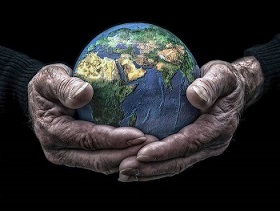
Man, writes Loren Eiseley, is the Cosmic Orphan. He is the only creature in the universe who asks, “Why?” Other animals have instincts to guide them, but man has learned to ask questions. “Who am I?” “Why am I here? Where am I going?” Since the Enlightenment, when he threw off the shackles of religion, man has tried to answer these questions without reference to God. But the answers that came back were not exhilarating, but dark and terrible. “You are the accidental by-product of nature, a result of matter plus time plus chance. There is no reason for your existence. All you face is death.”
Man, like all biological organisms, must die. With no hope of immortality, man’s life leads only to the grave. His life is but a spark in the infinite blackness, a spark that appears, flickers, and dies forever. Therefore, everyone must come face to face with what theologian Paul Tillich has called “the threat of non-being.” For though I know now that I exist, that I am alive, I also know that someday I will no longer exist, that I will no longer be, that I will die. This thought is staggering and threatening: to think that the person I call “myself” will cease to exist, that I will be no more!
And the universe, too, faces death. Scientists tell us that the universe is expanding, and everything in it is growing farther and farther apart. As it does so, it grows colder and colder, and its energy is used up. Eventually all the stars will burn out and all matter will collapse into dead stars and black holes. There will be no light at all; there will be no heat; there will be no life; only the corpses of dead stars and galaxies, ever expanding into the endless darkness and the cold recesses of space—a universe in ruins. So not only is the life of each individual person doomed; the entire human race is doomed. There is no escape. There is no hope.
If there is no God, then man and the universe are doomed. Like prisoners condemned to death, we await our unavoidable execution. There is no God, and there is no immortality. And what is the consequence of this? It means that life itself is absurd. It means that the life we have is without ultimate significance, value, or purpose.
The contributions of the scientist to the advance of human knowledge, the researches of the doctor to alleviate pain and suffering, the efforts of the diplomat to secure peace in the world, the sacrifices of good men everywhere to better the lot of the human race–all these come to nothing. This is the horror of modern man: because he ends in nothing, he is nothing.
If life ends at the grave, then it makes no difference whether one has lived as a Stalin or as a saint. Since one’s destiny is ultimately unrelated to one’s behavior, you may as well just live as you please. As Dostoyevsky so aptly put it: “If there is no immortality then all things are permitted.”
If there is no God, then there can be no objective standards of right and wrong. Moral values are either just expressions of personal taste or the by-products of socio-biological evolution and conditioning. In a world without God, who is to say which values are right and which are wrong? Who is to judge that the values of Adolf Hitler are inferior to those of a saint?
The concept of morality loses all meaning in a universe without God. As one contemporary atheistic ethicist points out, “to say that something is wrong because . . . it is forbidden by God, is . . . perfectly understandable to anyone who believes in a law-giving God. But to say that something is wrong . . . even though no God exists to forbid it, is not understandable. . . .” “The concept of moral obligation [is] unintelligible apart from the idea of God.
In a world without God it is impossible to condemn war, oppression, or crime as evil. Nor can one praise brotherhood, equality, and love as good. For in a universe without God, good and evil do not exist—there is only the bare valueless fact of existence, and there is no one to say you are right and I am wrong.
If God does not exist, then life is futile. If the God of the Bible does exist, then life is meaningful. Only the second of these two alternatives enables us to live happily and consistently. Therefore, it seems to me that even if the evidence for these two options were absolutely equal, a rational person ought to choose biblical Christianity. It seems to me positively irrational to prefer death, futility, and destruction to life, meaningfulness, and happiness. As Pascal said, we have nothing to lose and infinity to gain.
Source: The Absurdity of Life without God by William Lane Craig, Reasonable Faith. I hope you will take the time to read the entire essay at the link provided.

